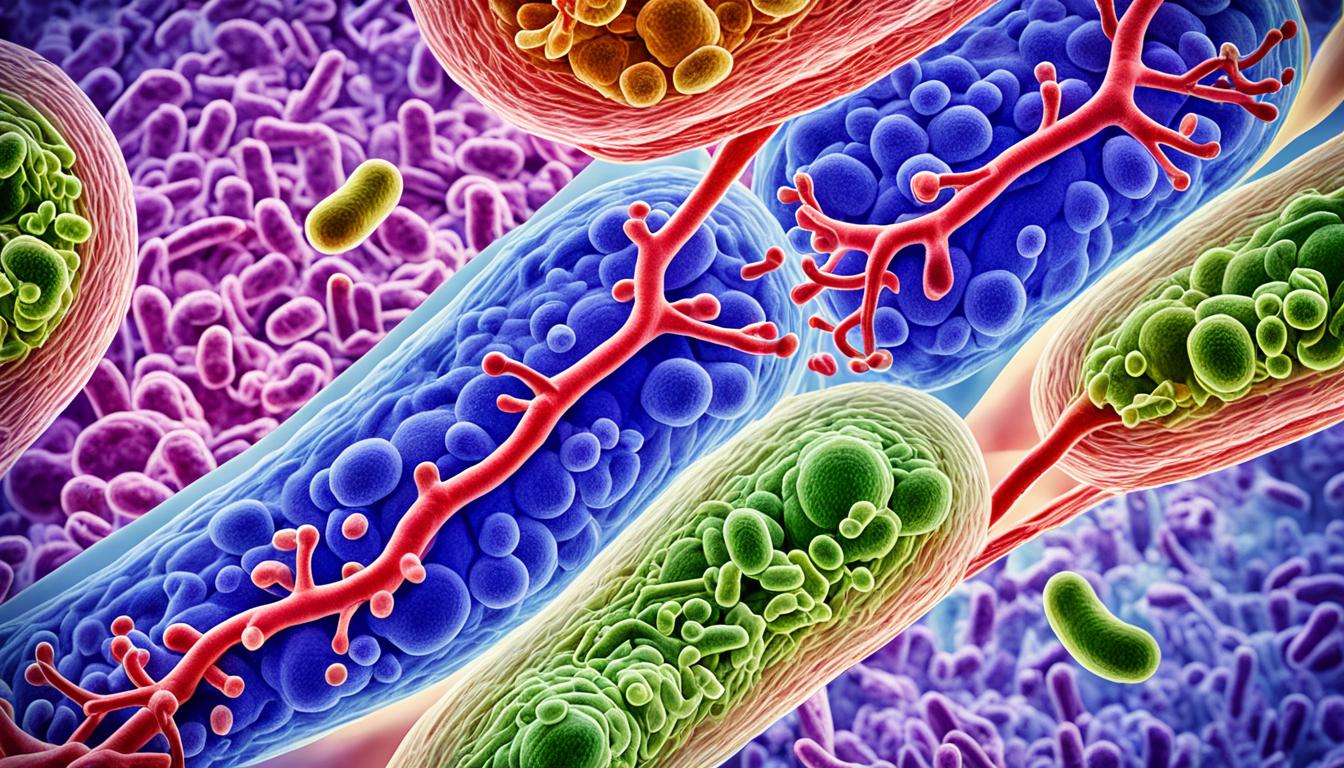Listeria infection, or listeriosis, comes from eating Listeria monocytogenes bacteria. It can make people very sick, especially those who are pregnant, older, or have weak immune systems. The sickness shows as fever, muscle pains, feeling sick, and diarrhea. In very bad cases, it can cause meningitis or encephalitis.
To find out if someone has listeriosis, doctors do tests like checking the blood or spinal fluid. The usual treatment with antibiotics has worked well. But, there’s hope in a newer treatment called stem cell therapy.
Key Takeaways:
- Listeria infection, or listeriosis, is caused by consuming Listeria monocytogenes.
- Symptoms of listeria infection include fever, muscle aches, nausea, and diarrhea.
- Severe cases can lead to nervous system infections like meningitis or encephalitis.
- Diagnosis involves laboratory tests such as blood cultures or spinal fluid analysis.
- Standard treatment consists of intravenous antibiotics, but stem cell therapy shows promise.
Symptoms of Listeria Infection
Listeria infection shows different signs for each person. Symptoms include fever, muscle aches, headache, nausea, and diarrhea. They often start a few days after eating tainted food and can last a week.
Symptoms can get worse if the infection reaches the brain and spinal cord. This may cause a stiff neck, confusion, loss of balance, and seizures. For pregnant women, the symptoms might feel like the flu.
But, listeria during pregnancy can be dangerous for both mother and baby. Listeria comes from Listeria monocytogenes bacteria in tainted food, like deli meats and soft cheeses.
Common Symptoms of Listeria Infection:
- Fever
- Muscle aches
- Headache
- Nausea
- Diarrhea
Severe Symptoms of Listeria Infection:
- Stiff neck
- Confusion
- Loss of balance
- Convulsions
Prevention of Listeria Infection:
It’s key to prevent listeria infection. Ways to do this include:
- Cook meat all the way through
- Wash fruits and veggies well
- Avoid raw milk and its products
- Be careful with washing hands and cooking tools
Extra care is needed by those with weak immune systems, pregnant women, and the elderly. They should avoid risky foods.
Next, we’ll talk about what causes listeria and a possible new treatment with stem cells.
Causes and Prevention of Listeria Infection
Listeria infection comes from food with Listeria monocytogenes bacteria. This includes some meats, unpasteurized dairy, and certain fruits. These bacteria can even grow in the fridge, which is pretty scary.
Deli meats, hot dogs, soft cheeses, and smoked seafood are at high risk. They are often processed in ways that can let Listeria grow. Plus, Listeria might get on deli meats after they’re sliced.
Good food safety is key to avoiding Listeria infection. Cook meats well, especially poultry and ground meats. Also, always wash fruits and vegetables before eating to remove any bacteria on them.
Stay away from raw milk and some soft cheeses to lower your Listeria risk. And always keep your hands and cooking tools clean to avoid spreading bacteria.
People with weak immune systems, pregnant, or older are more at risk. They should be extra careful about what they eat. This means avoiding certain foods and being very strict about food safety.
Key Prevention Tips:
- Cook meats thoroughly, especially poultry and ground meats
- Wash fruits and vegetables under running water before consuming
- Avoid unpasteurized dairy products
- Practice proper hygiene during food preparation
- Avoid high-risk foods such as deli meats, hot dogs, soft cheeses, and smoked seafood
- Pay extra attention to food safety if you have a weakened immune system, are pregnant, or are an older adult
Stem Cell Therapy for Listeria Infection
Stem cell therapy is a new way to treat listeria infection. Stem cells are special cells that can become many other types of cells. They help repair the body and adjust the immune system, which can help in fighting off infections and lessening inflammation. This leads to better health outcomes for patients.
In tests, stem cell therapy has improved survival rates and made listeria infections less severe. But, more study is needed to understand fully how beneficial and risky it may be. Since it’s considered an experimental treatment and isn’t widely available, it’s important to talk with a doctor. They can help decide if it’s a good idea for someone with a listeria infection.
While stem cell therapy looks promising for listeria, it should not replace standard care like antibiotics. Using it needs careful thought, based on a person’s health, age, and other medical conditions. Working closely with doctors is key. This way, patients can choose the best treatment for their listeria infection.

